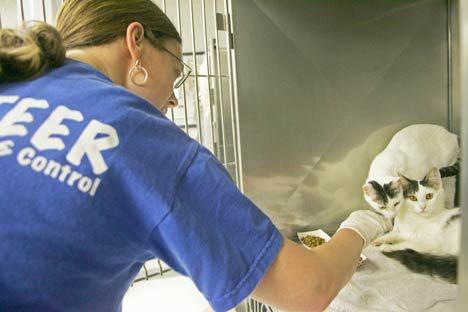Planning has started between King County and city officials throughout the county to develop a new regional model for animal control and sheltering.
Staff from as many as seven cities, including Kent, met as part of a small work group Jan. 27 with Carrie Cihak, strategic initiatives director for County Executive Dow Constantine’s office, to come up with ideas for a regional animal care and control program run mainly by the cities rather than the county.
The county, citing a variety of issues, is pulling out of the animal control and sheltering business, with a deadline of June 30. It operates two shelters – one out of Kent, and another out of Bellevue.
“We’re working very hard with the cities on the process to develop and agree on a common approach for a regional model and will do whatever it takes to get there,” said Frank Abe, spokesman for Constantine, in a phone interview Wednesday.
The County Council adopted an ordinance Monday submitted by Constantine to extend the deadline for closing the Kent and Bellevue shelters to June 30 from Jan. 31.
Constantine wants more time to work out a regional model with the 32 cities, including Kent, that contract with the county to run the shelters, animal-control services and the pet-licensing program.
It should take at least a couple of months before a specific plan goes for approval to the Metropolitan King County Council as well as city councils across the county.
The County Council in November directed the county executive to end the sheltering services by Jan. 31. The Council also wanted the cities to take over animal-control field services by June 30, unless new agreements allow the county to recover from the cities the full cost of those services.
County officials say revenues from pet licenses and other supporting fees have fallen about $2 million short per year of the $5 million cost of providing animal care and control. With a projected budget shortfall of $56 million in 2010, the county wants out of the animal business to focus on its other services and programs.
County staff estimated the additional five months of sheltering animals will cost the county about $1.075 million. Abe said staff has not yet determined what other county services might have to be cut in order to fund the shelters.
“We’re working to identify the source,” Abe said.
John Hodgson, chief administrative officer for the city of Kent, said Jan. 27 that the small work group of county and city staff is the right path to take.
“It’s a partnership to figure out a regional plan to present to our policy makers,” Hodgson said. “They will meet regularly for a plan for (animal) control services and funding, shelters and funding and find ways to increase pet-license revenues. The plan is to come forward in the next couple of months with a plan.”
Hodgson and Jeff Watling, city parks, recreation and community services director, will brief the Kent City Council about the future of animal care and sheltering at a workshop at 5:30 p.m. Feb. 2 at City Hall. Watling is part of the city-county small work group that met Jan. 27.
Hodgson does have concerns about how cities can fund animal care and control because the cities also face budget shortfalls.
“Everyone is trying to work hard to create a regional solution and take the financial pressure off of King County,” Hodgson said. “But I don’t know if the cities are ready financially. None of us, that I know of, have budgeted extra money for animal control.”
In addition to meetings with city officials, county executive staff continues to meet with community agencies (such as the Seattle Humane Society) that might play a role in sheltering, as well as animal-care and control employees for their ideas about a regional model.
“The groundwork is time-consuming but it’s important to lay the groundwork to get to a final outcome that works for everyone,” Abe said.
The county executive’s office (under then-County Executive Ron Sims) and the County Council started to battle nearly three years ago about animal care after a September 2007 citizens committee report called shelter conditions in Kent “deplorable.”
The Council claims it wants the county out of the sheltering business not only to save money, but also to improve treatment of the animals through a new regional model.
Talk to us
Please share your story tips by emailing editor@kentreporter.com.
To share your opinion for publication, submit a letter through our website https://www.kentreporter.com/submit-letter/. Include your name, address and daytime phone number. (We’ll only publish your name and hometown.) Please keep letters to 300 words or less.

